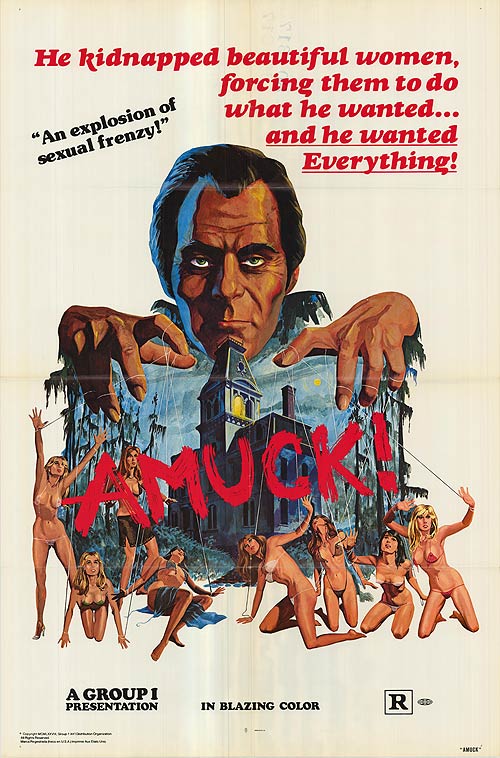Unable to gather any conclusive evidence of the Stuarts' guilt, however, Greta finds herself becoming increasingly drawn to Richard, and convinces him to reveal the truth about what happened to Sally. Is he really divulging the truth, however? Or is he telling the almost-truth, while omitting a key detail? Yes, yes he is.
Sadly, the film isn't all that good. The initial set-up is promising enough, with the ulterior motivation behind Greta's taking her position with the Stuarts laid bare almost immediately, followed by her taking her position for the aforementioned bare lay, but not a hell of a lot happens thereafter. The set-up is more Agatha Christie mystery than murder-heavy giallo, with the plot centred around a single murder which takes place prior to the events depicted in movie. We do eventually see a representation (not necessarily an accurate one) of this murder, but the first 'real-time' killing happens within the final ten minutes of the film.
A paucity of murders doesn't necessarily equate to a paucity of set-pieces, and there is a strong scene in which Greta's life is endangered during a hunting expedition.* That's about it though, apart from a mildly suspenseful sequence in which Greta has to escape from a cellar and return a key to Richard's office without being seen. There's a vague sense of gradually escalating dread, and an ever-increasing threat to Greta's life, but, as is repeatedly made clear, she herself has chosen to take up her position with the Stuarts, and then refuses to leave it, so our sympathies for her are limited.
Surprisingly, given the relatively sedate plot, we don't actually get all that big an insight into the characters. Italian genre films in general tend to be lacking on this front; they can never quite nail a comprehensive psychological investigation of a character (their preferred investigation being of the external, murder-solving sort). Saying that, one of the things we all love about these films are their moments of crazed non-sequiturs, or, to put it another way, the barmy characters doing barmy things. If the focus was on a realistic character study, the wilder eccentricities which form much of the giallo DNA would be lost. That's not to say there aren't giallo which successfully delve into the depths of the human psyche, it's just that this isn't one of them.
One of the main reasons for our inability to really get to know Greta is her lack of a friend or colleague who can act as a sounding board. She does relate her suspicions to the local police commissioner, but for much of the rest of the time she's mute, even during (one-sided) conversations with her hosts/employers. When she does speak, she displays all the hallmarks of the slightly vapid giallo heroine. One of the more egregious examples of this comes when she's trying to explain to the commissioner how Richard is toying with her with the details of his new story. She says, "He’s dictating everything to a tape recorder and... oh it’s much too difficult to explain." No it isn't! Just tell him that the recordings detail the real-life murder of your friend, you fool!
This is an example of behaviour which could only exist in a film, along with the classic phonecall-in-which-someone-tells-the-police-they-they-know-who-the-killer-is-and-will-tell-them-face-to-face-rather-than-just-saying-the-bloody-name-over-the-phone. Barbara Bouchet actually does a good job of emoting throughout, but there's not quite enough on the page for her to work with.
Speaking of there not being enough on the page, the mystery plot is amazingly thin. Without giving too much away (well, OK, giving too much, but not everything away) this is a film in which you're led for most of the running time to think that one thing has happened, only for a lateish semi-twist to apparently tell you that you were slightly, but not totally, incorrect. But then another twist tells you that, actually yes, you were a hundred percent right all along. Not exactly from the M Night Shymalan school of shocks. There is a late, late attempt at another twist, through the final line of the film, but this revelation doesn't actually change anything or make us reconsider anything at all.
Considering the plot-heavy nature of Silvio Amadio's first giallo, Assassination in Rome (compare the length of my synopsis for that film with this one), the lightweight story here is something of a surprise. He was likely attempting to create more of a mood piece (a sexy mood piece at that). There are some atmospheric scenes, and the cinematography is very handsome, if never overly suspenseful. Amadio was clearly a director from the classical school, with no avant-garde Argento-esque (or even Martino-esque) touches on show here beyond the slow motion sex. For a lot of you, though, those scenes will lead to more than enough avant-garde touches. you disgusting pervs.
|
|
*This hunting scene is one of a few touches which suggests that Silvio Amadio had seen Straw Dogs shortly before conceiving of this film. Other similarities include a rape scene which the victim apparently enjoys (the lesbian one; don't forget that Greta's been drugged and was initially reluctant, you perverts), an apparently emasculated American writer living abroad, and a lumbering man-child who had a fondness for gripping women by the throats.
|

 RSS Feed
RSS Feed
